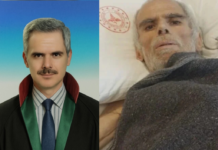Tacettin Başer, 58, a father of five, succumbed to cancer on Friday, two weeks after he was belatedly released from prison despite his deteriorating health, Bold Medya reported.
Başer’s health started deteriorating in February, according to his family. He was hospitalized several times but was always sent back to prison after being briefly treated. However, his health continued worsen and he lost 25 kilos. Doctors were unable to diagnose his condition and only said he suffered from “abnormal weight loss.”
At the request of Başer’s family, two other surgeons reviewed Başer’s medical reports on June 23, 2022 and stated that Başer was most likely suffering from cancer and therefore required further examination.
As a result Başer was taken to the hospital on July 19 for another examination, but the report could not be completed because there was no orthopedist on staff as required and he was made to return to prison once again. After fainting in his cell, Başer was examined once again and in July was diagnosed with Burkitt lymphoma, a type of cancer that is known to progress rapidly and affects the jaw, central nervous system, bowel, kidneys and other organs. Although it is an aggressive type of cancer, it is highly treatable if diagnosed in its early stages.
Başer was released from prison after Peoples’ Democratic Party (HDP) deputy Ömer Faruk Gergerlioğlu raised the issue on Twitter. His family also appealed for his sentence to be postponed in July. Nevertheless, he died nearly 15 days after his release.
Başer was first detained shortly after a coup attempt in Turkey on July 15, 2016 for alleged links to the Gülen movement. He was released pending trial two years later, and in August 2021he was arrested after an appeals court upheld a seven-year, six-month prison sentence.
Turkish President Recep Tayyip Erdoğan has been targeting followers of the Gülen movement, inspired by Muslim cleric Fethullah Gülen, since the corruption investigations of December 17-25, 2013, which implicated then-prime minister Erdoğan, his family members and his inner circle.
Dismissing the investigations as a Gülenist coup and conspiracy against his government, Erdoğan designated the movement as a terrorist organization and began to target its members. He intensified the crackdown on the movement following the abortive putsch in 2016 that he accused Gülen of masterminding. Gülen and the movement strongly deny involvement in the coup attempt or any terrorist activity.
A total of 319,587 people have been detained and 99,962 arrested in operations against supporters of the Gülen movement since the coup attempt, Turkey’s Interior Minister Süleyman Soylu said on November 22.
Opposition deputies and activists have repeatedly drawn attention to the plight of critically sick prisoners. Gergerlioğlu earlier said ill prisoners were not released until they were at the point of no return. He claimed that prisoners did not have access to proper healthcare facilities such as hospitals or infirmaries.
According to the Human Rights Association (İHD), as of June 2020 there were more than 1,605 sick inmates in Turkish prisons, approximately 600 of whom were critically ill. Although most of the seriously ill patients had forensic and medical reports deeming them unfit to remain in prison, they were not released. Authorities refuse to free them on the grounds that they pose a potential danger to society. In the first eight months of 2020, five critically ill prisoners passed away because they were not released in time to receive proper medical treatment.















